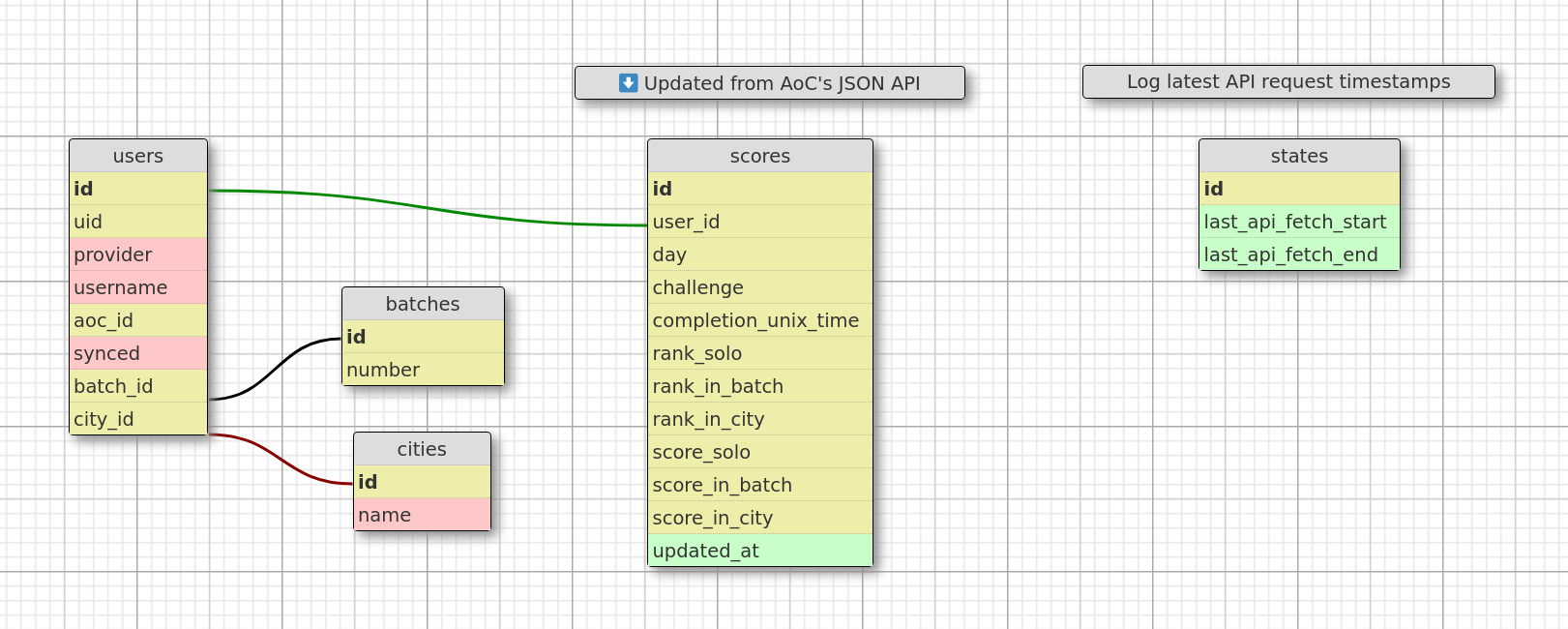Ruby 3.2.2
Rails 7.1.3.4
Found a bug? Do not hesitate to open an Issue.
Have a feature request? Let's discuss it on Slack.
If you want to help me fix a bug or implement a new requested feature:
- Make sure an Issue exists for it
- Ask me questions
- Fork the project
- Code the changes on your fork
- Create a Pull Request here from your fork
Upon Pull Requests (open, push), CI scripts are automatically run:
- linters (RuboCop, ERBLint)
- security tools (brakeman, bundler-audit)
- tests
Your PR should pass the linters, the security checks and the tests to be reviewed.
- Run
bin/setupto install dependencies, create and seed the database - Ask me for the credentials key and add it to
config/master.key, required for Kitt OAuth - Create a
.envroot file and add these keys with their appropriate values:AOC_ROOMS,SESSION_COOKIE - Run
bin/dev
Warning The
.envfile is used for development purposes only. It is not versioned and never should.
AOC_ROOMSis a comma-separated list of private leaderboard IDs that you belong to (e.g.9999999-a0b1c2d3,7777777-e4f56789)SESSION_COOKIEis your own Advent of Code session cookie (valid ~ 1 month). You need to log in to the platform, then retrieve the value of thesessioncookie (e.g.436088a93cbdba07668e76df6d26c0dcb4ef3cbd5728069ffb647678ad38)
Note Foreman is the default process manager through the
bin/devcommand. Overmind is an optional alternative.
Overmind is a process manager for Procfile-based applications like ours, based on tmux. You can install the tool on your machine following these instructions.
Add these lines to your local .env file:
OVERMIND_PORT=3000
OVERMIND_PROCFILE=Procfile.devThen, instead of the usual bin/dev, you have to run overmind s.
In short: create an SSL certificate for your localhost, store it in your keychain and run the server using that certificate.
mkcert localhost
sudo security add-trusted-cert -d -r trustRoot -k /Library/Keychains/System.keychain ./localhost.pem # macOS-specific
mv localhost* tmp/ # this is the tmp folder in the project root
bin/dev sslUntested on Linux.
Because the OAuth will not work on your local IP, you have to bypass authentication by temporarily adding this line, for example in the welcome controller method:
sign_in(User.find_by(github_username: "your_username"))Then, find the local IP address of the computer you launch the server from (ex: 192.168.1.14) and open the app on your mobile browser from that IP (ex: http://192.168.1.14:3000)
On adventofcode.com, a user can create one (and only one) private leaderboard. Up to 200 users can join it using a unique generated code.
A JSON object containing scores can be fetched from a GET request that needs a session cookie to succeed. We store this session cookie in the SESSION_COOKIE environment variable (valid ~ 1 month).
We use multiple private leaderboards to run the platform with more than 200 participants. We store their IDs in the AOC_ROOMS environment variable, comma-separated. One account joins all of them, and we use this account's SESSION_COOKIE.


